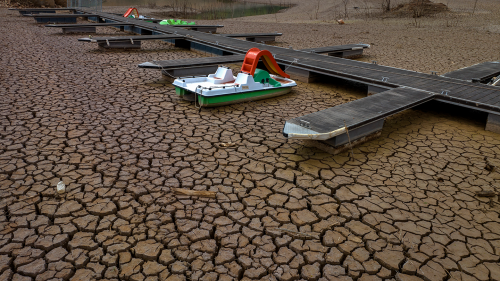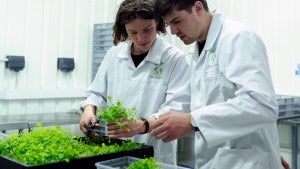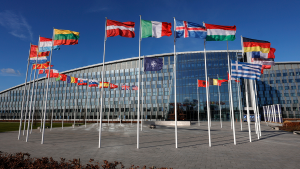AIM4C Summit, Egg-celent News, and Locust Fears
Check out our roundup of the week's top news and research in food, agriculture, and global development.

Top Story
The Next Laureate: Heidi Kühn
Heidi Kühn, the founder of the non-profit organization Roots of Peace, has been awarded the 2023 World Food Prize for her work restoring agriculture to de-mined land in former war zones. Over the past 25 years, Kühn has replaced mines with farmland and helped train farmers in modern agricultural practices in Afghanistan, Angola, and Vietnam. Her efforts have revitalized farmland, improved food security, and supported rural livelihoods and economic recovery in post-conflict regions.
Council Insights
An Aging Industry
“[Agriculture] is an old industry, but that does mean we can also learn from a lot of people who have been doing this the same way for so long,” said Ben Collier, CEO and Co-Founder of The Farmlink Project. Listen to more of his insights in episode two of our limited podcast series Youth in Agriculture: Transforming Local Food Systems. Prefer to read it? The transcript is available on our website now.
 Food and Agriculture
Play the podcast
Food and Agriculture
Play the podcast
Food & Agriculture
Locust Fears
FAO issued a warning about a potential locust outbreak in Afghanistan that could destroy up to a quarter of the country's wheat harvest. The Moroccan locust threatens food security, particularly in the northern provinces, Afghanistan's "breadbasket." Efforts are being made to control the outbreak using traditional mechanical methods due to a shortage of pesticides. The potential economic loss caused by the Moroccan locust pests could range from $280 million to an astonishing $480 million for Afghan farmers.
New Drought Package
Spain announced a $2.4 billion aid package to support farmers and improve water infrastructure in response to severe drought conditions for the second consecutive year. The package includes direct aid to farmers, investments in water supply improvements, and tax relief. Water shortages have become a pressing issue in Spain, and could affect upcoming regional elections.
Egg-celent News
Wholesale egg prices have dropped more than 80 percent since the start of the year after the avian influenza outbreak led to a price surge. Consumer demand has slowed, allowing supplies to rebuild, and the latest USDA report shows wholesale egg prices falling to around 78 cents per dozen from a peak of $5.30 at the end of last year. Although consumer prices are still higher compared to the previous year, lower prices are expected in the future.
Deeper Dive
What Is the State of Global Food Prices?
Global food prices rose in April, ending a year-long slide as the increase in sugar prices offsets lower grain prices. FAO’s food-commodity price index increased by 0.6 percent due to bad weather and lower fertilizer use affecting sugar crops. The rebound in food prices raises concerns about food inflation, which continues to strain consumer budgets and worsen the global hunger crisis, despite the index being down about 20 percent from its record high in March 2022.
Resilience
Climate Investments
The World Bank and the French Development Agency are providing $227 million in financing to Madagascar to support sustainable agriculture and rural livelihoods in critical regions. The funding will be used for watershed restoration, irrigation infrastructure rehabilitation, and climate-smart agriculture practices. The project aims to benefit 165,000 farmers, rehabilitate 30,000 hectares of irrigated areas, and strengthen the country's food systems in the face of climate change challenges.
DC Report
AIM4C Summit
During the Agriculture Innovation Mission for Climate (AIM for Climate, or AIM4C) Summit, partners announced increased investment in climate-smart agriculture and food systems innovation, with the investment fund now exceeding $13 billion. New partners have joined the initiative, bringing the total number of governments and knowledge partners to over 500. Secretary Tom Vilsack also unveiled the USDA Science and Research Strategy for 2023 to 2026, which aims to transform agriculture and support US farmers, producers, and foresters with scientific innovation.
Big Actors
Corn Security
China has received its first significant shipment of corn from South Africa as part of its efforts to diversify its grain sources. The state-owned trader COFCO Group imported 53,000 metric tons of feed corn and plans to expand procurement sizes and explore bulk carriers for grain transportation. China is trying to reduce its reliance on the United States and Ukraine for corn imports and is seeking to acquire critical grains from various sources to ensure food security.
Big Ideas
Seaweed Farming
Seaweed farming is gaining traction as an eco-friendly and sustainable solution in the global food industry. Companies have announced plans for large-scale seaweed farms to cultivate seaweed for various applications, including food production and carbon sequestration. With the potential to alleviate land use pressure and reduce greenhouse gas emissions, the global seaweed market's expected worth is nearly $25 billion by 2028.
Ask an Expert
What are your main takeaways from the AIM for Climate Summit?
"The Agriculture Innovation Mission for Climate summit in Washington, DC this week fired the starter’s pistol for a series of ‘innovation sprints’ aiming to help farmers around the world adjust to changing climatic conditions while decreasing the environmental impact of farming. Microbes to improve soil health, seeds to grow in harsh conditions, irrigation to conserve water, algorithms to plot data and foreshadow weather extremes, moon shot ambitions to sequester carbon and reduce greenhouse gas emissions – all measured against the relentless tempo of extinction thermometers and climate countdown clocks. But the most urgent race of all, and the biggest hurdle to leap, will be getting the science and technology out of the air-conditioned conference rooms and off the high-tech drawing boards and into the hands of the 500 million smallholder farmers who are already feeling the harshest impacts of climate and environmental threats."
— Senior Fellow Roger Thurow


Have a question about food and agriculture? Ask one of our experts at the Center on Global Food and Agriculture to get an answer in next week's Global Food for Thought!
Council Events
Did you miss one of our previous livestreams? Don't worry! They are all available on our website to watch at any time.
Other Upcoming Events
USDA Veteran’s Mental Health and Suicide Prevention Workshop
Date: May 16
Time: 1:00 – 2:00 p.m. CT
USDA Rural Mental Health Matters: Challenges, Opportunities, and Resources for Communities
Date: May 23
Time: 1:00 – 2:00 p.m. CT
Talk Climate Gathering
Date: May 23 - 25
Farm Subsidies and International Trade Rules
Date: May 25
Time: 9:30 – 11:00 a.m. ET
IFAD Innovation Day 2023
Date: June 28
Time: 7:00 a.m. GMT.
Land Acknowledgement Statement
The Center on Global Food and Agriculture recognizes it occupies the ancestral land of the Kiikaapoi, Peoria, Kaskaskia, Bodwéwadmi, and Myaamia people. Indigenous communities around the world disproportionately experience the pressures of climate change, global conflicts, and the COVID-19 pandemic, while simultaneously stewarding 80 percent of the world’s biodiversity. These Indigenous tribes and nations are the original owners of this land and continue to be systemically erased by policies and practices that ignore their histories. To learn more about Indigenous foodways and practices, check out our 2022 blog series "Stewardship, Sovereignty, and Solutions."
Related Content
- Embracing Dandelions as Food and Medicine
- Going Beyond Regenerative Agriculture on Tribal Lands
- Expanding "638" to Enhance Native American Food Sovereignty
- Flavors and Culture: Food Systems Through Indigenous Women's Eyes
- A Thanksgiving Legacy: Fighting for Indigenous Food Sovereignty
- Native Food Sovereignty: Strengthening Connection to Culture
- Reconnecting to Indigenous Food Sovereignty Values and Practices
- Embracing Interconnectedness: How Indigenous Foodways Can Save Us




